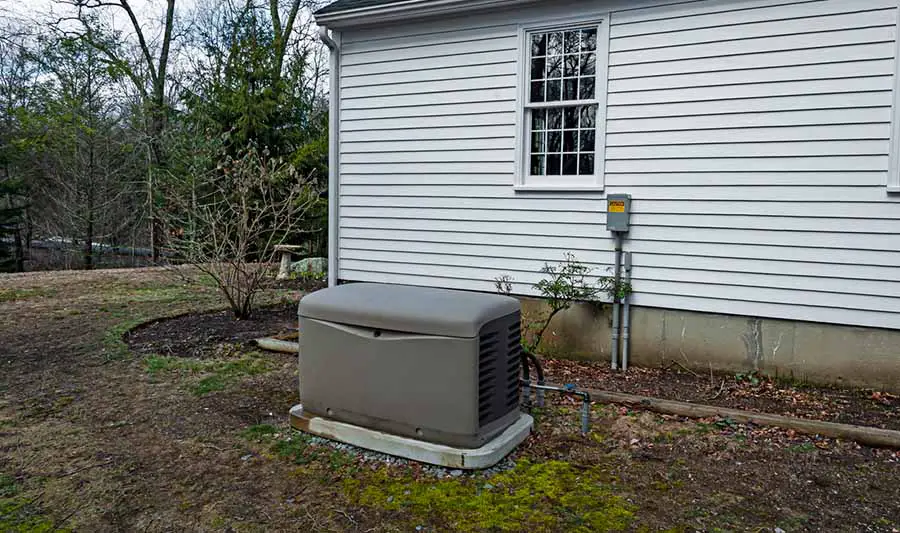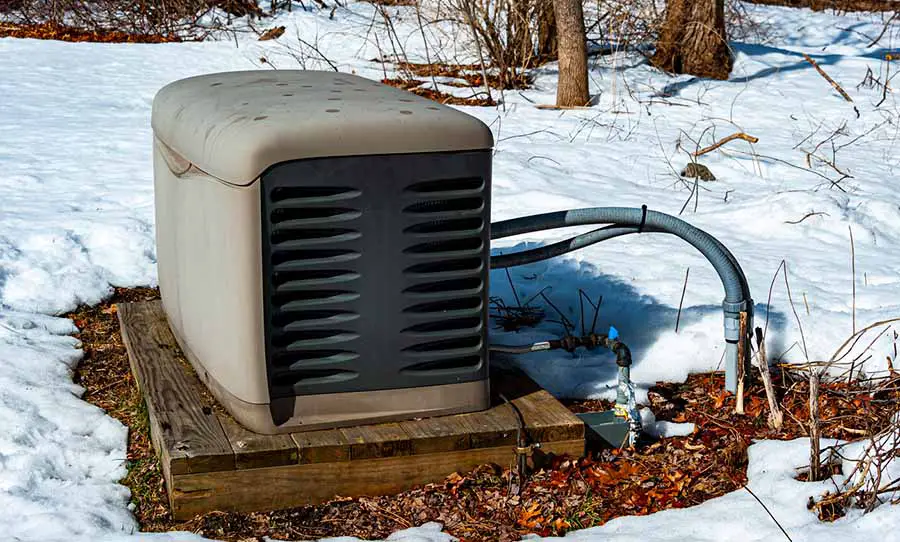
A whole house generator is also called a standby generator. It can power an entire house compared to a backup generator, which usually only powers a few essential appliances. A whole house generator isn’t cheap, so you need to consider whether it’s a worthwhile investment or not.
Where power outages are prolonged and frequent, installing a whole house generator can add significant value to your home. In some areas, you can see a 50% return on investment when installing a generator. Whole house generators can keep heating going and keep food from spoiling during a power outage.
Standby generators usually are permanently installed and wired into your home’s circuit board. They can run on diesel, liquid propane, or natural gas. Unlike portable generators, they require professional installation and come with maintenance plans from the supplier.
A Whole House Generator Can Increase the Value of Your Home
If professionally installed according to your area’s legal requirements, a standby generator can yield up to a one hundred and fifty percent return on investment. This means that your home could increase in value by one and a half times the amount you spend on the generator.
Depending on your electricity needs, you could pay between $7,000 and $12,000 for a whole house generator. This is a lot more than what you would pay for a portable backup generator. For a commercial building, standby generators can cost even more.
However, if you pay $12,000 for a home generator installation, the property value could potentially go up by as much as $18,000. The extent to which you could recoup your standby generator’s cost depends on your home’s size and location and how much of it is powered by the generator.
You may not always be able to recover the full cost. Generally, the return on a generator investment is roughly between 56 and 84 percent. If the generator is an eyesore or is old or poorly maintained, a potential buyer could see it as a liability.
If you live in an area where power cuts are prolonged or frequent, a standby generator could be a selling point and help you get your asking price. Some reports show that having a whole house generator can increase your home’s value by 5% or more.
Here are some tips for optimal home value increase when installing a standby generator:
- Choose a quality and affordable generator
- Make sure it goes well with the house and is not an eye sore
- Keep the generator properly maintained and in good working condition
- Make sure to have a detailed and full maintenance record
To ensure that your home benefits from a standby generator’s value, it must be installed by a certified electrician. The installation of some generators requires the services of a licensed plumber too. A generator is a bulky machine that sits outside on a concrete slab.
If you don’t have natural gas in your neighborhood, you should also install a diesel bladder or a natural gas or propane tank to ensure a decent fuel supply.
The generator must have a full maintenance record and be located in an area where it does not detract from the home’s overall appearance. Apart from adding monetary value to your home, whole house generators have other advantages that make them attractive to homeowners.
Whole House Generators Can Power Your Home for Days
If you live in an area that experiences blackouts more than three times a year or lengthy power failures of more than four hours at a time, then a standby generator is more of a necessity than a convenience.
While they are much more expensive than portable generators, they can keep lights, heating, and essential equipment running for days at a time. If you work from home, they can keep your business going and prevent disruptions in work schedules that cause a loss of income.
A whole house generator that runs on natural gas can be connected to existing gas lines. No matter what fuel they use, these generators are set up to kick in automatically when the power fails.
If there is no gas pipeline in your area, a propane generator is probably the best solution. You can have large propane tanks installed on your property that can be refilled by delivery trucks. Propane burns cleaner than diesel and is also cheaper.
Unlike a portable generator, you don’t have to manually connect a standby generator, and there is no need for multiple power cables. You don’t have to go outside in extreme weather conditions to start the generator. When the grid is restored, the generator switches off automatically.
Standby generators vary in the amount of power they provide, so calculate both starting watts and running watts of appliances to establish your home’s electricity needs. An electrician would be able to help with this. It is not so much your home’s size that determines how much power you need as the number and nature of electrical items you want to run.
Whole House Generators Give You Peace of Mind

If you are away from home, you might return to food rotting in the freezer or discover that you have been robbed because the security system failed due to a power outage. With a standby generator that comes on automatically when the power goes out, this need not happen.
If you are at home when the grid gives in, you don’t have to sit in darkness worrying about burst pipes and food spoilage. You can still have access to the internet; you can still charge your cell phone or use your computer and maintain contact with the outside world.
If you need an electrical medical device to deal with conditions like asthma, sleep apnea, or breathing difficulties, a power failure need not be a life-threatening event. Extreme weather conditions and temperature drops are leading causes of death in the elderly.
With a whole house generator, you don’t need to go tripping and falling in the dark looking for a candle or a flashlight so that you can go outside and start your portable generator.
Considerations When Buying a Whole House Generator
Here are some additional considerations when buying a whole house generator for your home:
- Energy Output – Standby generators range in power output from 5,000 to 20,000 watts for home use. You can decide to power your entire house or just a certain number of electrical sockets, lights, and appliances.
- Permits – You will need municipal or town permits to install a whole house generator and consider legal noise limits and other rules regarding the generator’s location. A certified electrician will be able to help with this.
- Clearance – The gas and electric company in your area will have specific clearance requirements for standby generators. Also, generator manufacturers stipulate guarantee requirements; for example, the generator should always be at least five feet from doors, air vents, and flammable materials.
- Fumes – All generators emit fumes, so keep these to a minimum by choosing natural gas or propane. They burn much cleaner than diesel. Locate the generator downwind of the house where possible. Fumes can be hazardous to your health because they contain carbon monoxide.
- Noise – A standby generator can be noisy so consider the neighbors when choosing a location. Please don’t put it near bedroom walls or living rooms where your family can be disturbed by the noise.
- Transfer Switch – You must install a standby generator with a transfer switch to prevent back-feed that can damage your home’s electrical system, the generator itself, or cause serious injury or death to utility workers.
- Warranty – Choose a generator that comes with a warranty of at least five years, even though it may be slightly more expensive than one with a shorter warranty. You must have enough space to install the generator in an easily accessible area for maintenance and repair purposes.
- Maintenance – It is advisable to purchase a maintenance plan with the generator. It is best to call a professional who understands all the moving parts to maintain your standby generator. If you cannot pay for proper maintenance for a whole house generator, perhaps you should buy a portable one instead.
- Inspections – You must get annual inspections and routine servicing for standby generators with less than 250 hours of yearly run time. While you should change filters and oil every year, cranking batteries commonly need to be replaced every two to three years.
Conclusions
Whole house generators can add value to your home if they are lawfully and correctly installed. If the grid in your area is becoming increasingly unstable, causing frequent power cuts, a generator can be a selling point for potential buyers. However, the value of a generator is not measured only in money. It can provide peace of mind for a homeowner and may even save a life.
